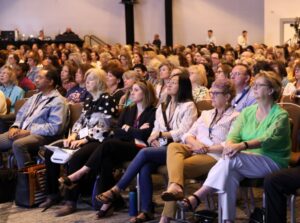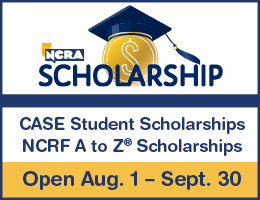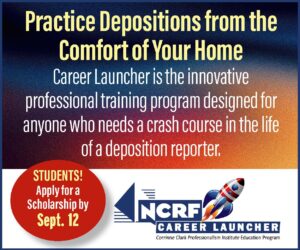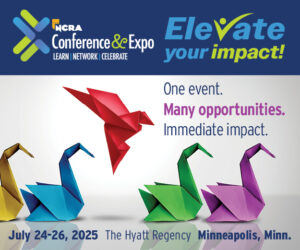
Left to right: Georgina Ford, Juli LaBadia, Sheri Smargon, Traci Mertens, and Sheryll Holley at Intersteno 2022 in Maastricht
When Doug Zweizig, RDR, CRR, of Wilmington, Del., was recently profiled by the JCR, he mentioned how fellow National Court Reporters Association member and coworker Juli LaBadia, RDR, CRR, had won the Intersteno 2022 Contest in the Netherlands. “What are the chances the world double champion and national double champion are in the same office with offices next to each other?” wrote Zweizig in his email suggesting we reach out to Juli.
Juli was a member on the United States team with fellow NCRA members Sheri Smargon, RDR, CRR, CRC, of Riverview, Fla., and Traci Mertens, RDR, CRR, CRC, of Alexandria, Va. – all three of whom earned medals this year. Also in attendance were two colleagues on the United Kingdom team many NCRA members are familiar with; Georgina Ford, RMR, CRR, of Telford, England, and Sheryll Holley of Mid Glamorgan, Wales, all of whom were kind enough to be interviewed about their experiences in Europe, including how Smargon, Ford, Holley, and LaBadia also provided captioning for the entire conference which streamed globally in at least ten other languages.
JCR | How did you enter the court reporting or captioning field?
JL | I was in college at the University of New Mexico finding that college chemistry was not as fun as I’d hoped, and happened to meet Geri LaFleur, who ran a court reporting program in Albuquerque at that time. After talking to her, I made the jump to court reporting.
TM | I was working full time and attending night school to get my bachelor’s degree, and I had some elective hours to take. My mom encouraged me to try court reporting, so I took it as an elective course.
SS | I captioned straight out of court reporting school because I couldn’t find a “regular” court reporting job. Back then, if you shook a tree ten court reporters looking for work fell out of it. How times have changed! Because of this oversaturation in the market, I became part of the team who started a pilot project to be the first county in the country to open-caption their county government meetings.
GF | Completely by accident! I was looking for a university course and came across an advertisement for a trainee court reporter. It was under a scheme set up by the then–Lord Chancellor’s Department to train people in Computer Aided Transcription and move away from pen shorthand or manual machines. All my training was on the job (and I was paid while training), and I was accredited in under a year. I learnt Palantype, the British system.
SH | I originally trained as an electronic notetaker in the U.K. to work with deaf people as I was a very fast QWERTY typist and had trained at school on manual typewriters. A friend had thought that I’d make a really good stenographer, but I never knew how to get into it.
During one of my working days as a notetaker, I was at a conference with stenographers and palantypists working to big screen. I chatted to them and soon after found a distance learning programme. All the schools offering face-to-face training had closed down at this point and the only other option was to move to Bray in Ireland, which wasn’t an option as my children were at school. I started training via distance learning in 2000 and qualified to the minimum standard late 2004/early 2005.
JCR | What is something you wish people knew about court reporting/captioning to entice them to enter this field?
JL | I think it’s that being a stenographer is such a rewarding and interesting job. Of course, it’s not all “set your own hours and take exotic skiing vacations” (as the commercials in the 1980s implied), but it is a career where you’re always learning and growing (how many different subject areas do we hear witnesses testify about?), you can support your family while also making time to attend your kids’ activities, and we need you!
TM | If people understood the flexibility and choices they could make in this field, I think many more would consider it.
SS | At the state level, I think we are getting the message out very well about the benefits of becoming a stenographer, not just a court reporter. Florida Court Reporters Association (FCRA) created material that we give out at job fairs and student engagement meetings with the benefits and opportunities that stenography and court reporting offer, including CART and captioning avenues.
GF | For a start, in the U.K. that it exists as a profession, but mainly the sheer variety of work. It’s not about the stereotype of sitting in a courtroom tapping away silently, wearing sensible shoes, horn-rimmed glasses, and a slightly stern expression! In my 30-plus years, I’ve traveled all over the world doing both court reporting and CART captioning, and it truly never gets boring.
SH | I loved to travel, and I liked being my own boss. I like supporting people, and people skills are really important in this job. I suppose I have a high satisfaction rate in my job. If you can play a musical instrument, it’s a good indicator that you would be able to train and qualify.
JCR | What part of your trip to compete at Intersteno stood out the most?
JL | For me, the highlights are, first, captioning the conferences and streaming the captions to probably ten languages this time (using Text on Top). We’ve formed such a bond of camaraderie! Also, watching the young kids compete is just amazing. The age classes for competition are pupil, up to 15 years old; junior, up to 20; and seniors, the over-20 crowd. There are amazing competitors in keyboarding (you wouldn’t believe how fast they are on a QWERTY keyboard); pen writers (always amazing!); voice writers (called respeakers in Europe); and, of course, the stenos (or chord writers). The different steno machines used throughout the world is also always fun to learn about.
TM | The camaraderie, meeting new friends, the location. It was my first trip to Europe.
SS | Meeting the other participants and learning how they do their jobs is always fascinating. Definitely the camaraderie amongst participants was a highlight. We were all rooting for one another, and that makes the experience enjoyable.
GF | This being the first post-COVID Intersteno, reuniting with friends made at previous congresses was very important to me, but the most fun is captioning the sessions, which we do on a voluntary basis.
SH | Stand-out moments were definitely hooking up with people after such a long time and meeting new friends and networking! The second-best highlight was discovering the differences between the meaning of different words in the English U.S. language and the U.K. language!
JCR | Are people aware of NCRA overseas when you talk with them?
JL | Yes, many are. Some Europeans are members of NCRA, and an Intersteno delegate comes to each year’s NCRA Conference & Expo.
TM | I believe they are.
SS | NCRA has a presence, but I’m not sure how great it is. Intersteno has some awareness within NCRA from participants, but it could definitely be increased.
GF | Certainly people at Intersteno are aware of the NCRA and as an overseas member myself, I do try to encourage more overseas people to join.
SH | Yes, definitely. I attended NCRA’s Conference in New Orleans in 2018 and really enjoyed it. Quite a few UK captioners and court reporters are members.
JCR | How has competing helped your career?
JL | Competing at Intersteno has let me expand my horizons and meet fascinating and fantastic people who do the equivalent of my job in the rest of the world. I’d say my NCRA certifications have helped my career, and competing at Intersteno is, for me, a fun, bonding experience. However, in some countries, especially for the juniors and pupils, doing well in the international competitions sets them up for life jobwise.
TM | Competition has made me a better writer. I started competing late in my career, 31 years in, and I’ve never looked back. It’s changed the entire trajectory of my career.
SS | Competing internationally isn’t much different from competing at NCRA from the standpoint that you’re challenging yourself against the best of the best. At Intersteno, that may be a 10-year-old from Croatia. What it does provide is acknowledgement that you can face challenges and adversity and overcome. Even if you don’t win a medal, you do feel a sense of accomplishment that you put yourself out there, and that translates into confidence on the job that you can handle anything.
GF | It gives me an extra level of confidence in my abilities. Even after 30-odd years, now and again my confidence can slip if I’m having a rough day.
SH | This is my second year of competitions. I only ever got to the minimum qualified level in the UK, and I have always shaken uncontrollably in exams and also competitions. It’s something I’m determined to conquer, as I’d love to get to a higher level and speed. I’m in the process of also shortening my theory, as I learned StenEd and now swapping to Mark Kislingbury’s theory. It’s quite a challenge to change theory after 22 years of training and captioning but I’m enjoying learning as I go. My competition speeds aren’t great but at least I’m not shaking now!
JCR | What are the medals or awards that you’ve earned? How is competing at Intersteno different from competing in the NCRA Realtime and Speed Contests?
JL | I won first place in the Speech Capturing (Speed) chord writers category and first place in the Realtime Speech Capturing. The contest material is different from NCRA: no Q&A, straight dictation somewhere between literary and legal opinion in density; usually a speech from the EU, it seems.
There are about eight categories of competitions, each with the three age levels, and sometimes broken out by your method of transcription – steno, keyboard, pen, voice. Everything is counted in syllables or characters per minute, not words. (We figured out that wpm is roughly the syllables per minute divided by 1.38). Speed is a 15-minute dictation starting quite slow, and up to about 297 wpm by the 15th minute. The realtime is a 10-minute dictation. Everyone is in the same room – so all the different languages and transcription methods – and you’re connected to an infrared receiver with your headphones, where you receive the dictation in your native language. I find the scoring to be a bit of a mystery still – well, more than a bit, but that’s the fun of it!
TM | At Intersteno 2022, I earned a silver medal in speech capture. It was the only event I registered for, and I regret that. Next time I’ll register for all of them!
I earned a medal at NCRA in 2018, three medals and a third overall in 2019, and a medal in 2021. I did not compete in 2022 because of a work schedule conflict.
SS | This was my second Intersteno competition. I competed in two events, and I placed second in Germany in 2017 in Speech Capturing that year. This year, I competed in five events (not sure what I was thinking!), and I placed first in Audio Transcription, third in Speech Capturing, and third in Realtime.
GF | These days, I always crash and burn in competitions so have no new medals … yet! I did receive a medal many years ago for being the first person in the UK to reach 250 wpm using a CAT-enabled machine, although that was back in the day when 250 wpm was seen as fast.
Having competed at both NCRA Conference and Intersteno, they are completely different animals. NCRA competitions are fast and furious from the outset but shorter. At Intersteno, those of us who are “chord” writers (i.e., steno/palan) generally make it the whole way through the longer dictation, and it’s a little disconcerting to have people using different methods drop away as it gets too fast.
SH | I’m still new to competitions but it’s great to compete. I placed middle of the road in Intersteno 2019, but I only entered the Realtime competition that year. I entered more [competitions] this year, and I didn’t come last, which is great. However, not many people entered this year compared to the previous Intersteno.
JCR | When it comes to the future of court reporting and captioning, where do you see the field headed?
JL | I see a struggle for the soul of the profession – it’s obvious already. So many former stenos are selling out to promote ER for their personal profit, with no respect for the integrity of the record. And I see that as long as there are competent stenographers, the higher-end work will be available for them. Complex corporate litigation and patent deps, stenos are the only ones capable of realtime, same day transcripts.
TM | There will always be a place for highly skilled stenographers. AI is here to stay, but it is not better than a human being as a guardian of the record. My hope is as AI continues to evolve, we also evolve and grow to be even more highly skilled stenographers.
SS | I have said this before, but we need to get out of our own way if we are going to be relevant in the future. We can’t wait until the last minute to cover a job, waiting to see if the requesting firm will offer a monetary bonus. We can’t pick and choose our jobs to our own detriment. Yes, there are attorneys we don’t want to work with, jobs that we don’t want or aren’t qualified for. I’m talking about turning down good work because we don’t want to put pants on and leave the house. COVID-19 changed the way we do business, certainly, but it shouldn’t have changed our work ethic so much that we are opening the door wider and wider for digitals and other methods to get a foothold.
GF | Well, it should already be realtime, super-fast delivery, efficiency. It’s really important that we, as working court reporters/CART captioners, control the narrative surrounding our profession. In the U.K., the Ministry of Justice decided to switch to digital recording in the courts. This meant that the only decent work available would be realtime and immediate copy when required by the law firms involved in hearings. Most of us were ready for that, having done realtime for many years by then, but not all. Reporters worldwide need to step up, get realtime certified, and stay ahead of ASR.
SH | I think there’ll still be work out there. I have lots of clients who hate automated captions with a passion! Even though speech recognition is much better, it still has a long way to go. When I started in 2000, I had a colleague try and put me off saying I wouldn’t be working long. I’m still here 22 years later!
JCR | What is the most rewarding aspect of your career?
JL | The fact that I’m constantly learning. This is my 36th year as a reporter, and I’m still improving my writing, making it shorter and easier. I’m the chief reporter in the Delaware Court of Chancery, and it’s incredibly gratifying and rewarding to know that the Chancery judiciary and practitioners very much acknowledge and appreciate the job we do for them.
TM | This career enabled me to raise my children as a single parent, send them to college, give them wonderful vacations, help them become the well-rounded young men they are. It gave me an opportunity to have my own home.
It has also given me an introduction to some of the finest people I’ve ever met, colleagues from all over the country, the world, I would not have met but for this career.
SS | In captioning, it’s knowing that I’m helping a consumer understand the world around them and the events that may be unfolding. In CART, it’s knowing I am helping a student get through a tough class they may not otherwise have attempted, or allowing a consumer to attend a conference and understand what’s going on within their profession in a way that may not have been available to them before.
GF | That’s a really difficult question. In the early days when I did a lot of CART captioning, it was definitely enabling access to those who needed it. Now I do a lot of public inquiries, which are used a lot in the U.K., and being part of a process that finds the truth and attempts to find suitable redress for victims is very fulfilling.
SH | I love supporting live events, especially onsite. We always get shocked looks on faces when people realize that the live captions are produced by a human. Also supporting new deaf people who haven’t used the service before – it’s great to see them light up as they are getting all the auditory information, especially if they have a profound hearing loss.
JCR | Do certifications matter?
JL | They absolutely do. We require a CRR and RMR to work in Chancery because the work is difficult and intense. You’ll nail that Speed Contest Legal Opinion if you come and work for me, because that’s our bailiwick! NCRA certifications are a baseline of who you are as a professional, especially as many states are going the way of not requiring state certifications. They show that you care about your profession and are committed to learning and growing as a stenographer.
TM | Certification absolutely matters. It opens doors. It gets you a seat at the table. It instills confidence. It’s critical.
SS | Yes! I am pro-certification and will always be pro-certification. It is the baseline for someone to understand you have the skills necessary to be competent at your job. I, personally, always knew I wanted to achieve every certification NCRA offered. I came to the RSA (Realtime Systems Administrator) party too late, so I missed that one, but if it ever comes back, I will add it to my toolkit. There are a lot of jobs I have been able to take that I would not have been qualified for without my certifications. I will never let them go. I spent too much time, money, sweat, and actual tears achieving them.
GF | While effectively there are no “official” court reporters in the U.K., we currently have a voluntary register for CART captioners which requires taking an assessment to ensure quality of service before you can be registered. Certification shows to your client that you have reached an industry standard and have a commitment to improving your skills.
SH | Yes, definitely. I’ve always struggled with qualifications, which is bizarre, as I can support thousands of people at a conference, yet I fall apart in an exam or competition situation. I understand it’s a common problem, and I’m not on my own.
JCR | Any tips or tricks when it comes to traveling with your machine(s)?
JL | Never, ever, ever check your equipment! I have an excellent leather backpack that fits my machine and laptop plus all the cords and chargers. I always bring at least two converter plugs to Europe; in case you accidentally blow one up, you don’t have to run around searching for a replacement.
TM | After spending four years on the road every week doing mass tort litigation before my current position, I learned to travel with my writer in a backpack. I never send it in my checked bags. It’s always with me. I thought about shipping it back after Intersteno, but I decided it’s safer with me.
SS | I carry my machine and all of my equipment with me at all times. I don’t ever check it while flying, and I keep an eye on it if I have to store it on a shelf (like recently on my train journeys in Europe). Just before my Intersteno trip, I purchased a new travel bag with 360 wheels. It made all the difference on the cobblestone streets!
GF | As I’m sure everyone will say, never check your machine in but carry it with you at all times! Personally, I always check my tripod in as I have sometimes had a few issues when going through security with it. It’s always worth having a brief explanation of what your machine is in case you’re asked, along with the obligatory “typing” mime.
SH | I always carry my machine as hand luggage and check in my tripod for flying. Always take a spare writer if you can if you are working onsite. Or if you are working in a team, make sure someone takes a spare writer.
Shorthand/Speech Capturing – Chord keyboard – SENIORS (ages 17 and up)
Name Country Language
1 Julianne LaBadia, RDR, CRR, CRC United States English
2 Traci Mertens, RDR, CRR, CRC United States English
3 Sheri Smargon, RDR, CRR, CRC United States English
4 Georgina Ford, RMR, CRR United Kingdom English
5 Daniela Busalacchi Italy Italian
6 Sheryll Holley United Kingdom English
7 Wilhelmus J. Gerbecks Netherlands English
Total participants: 7
Real Time Transcription – SENIORS (ages 17 and up)
Name Country Language
1 Julianne LaBadia, RDR, CRR, CRC United States English
2 Daniele Casarola Italy Italian
3 Sheri Smargon, RDR, CRR, CRC United States English
4 Hakan Kurt Turkey Turkish
5 Daniela Busalacchi Italy Italian
6 Šimun Džalto Croatia Croatian
7 Andrea Akhlaghi Farsi Italy Italian
8 Karin Cieslarová Czech Republic Czech
9 Andrea Wawrzynek Croatia Croatian
9 Georgina Ford, RMR, CRR United Kingdom English
11 Stjepan Džalto Croatia Croatian
12 Tomáš Portych Czech Republic Czech
13 İlyas Pamukçu Turkey Turkish
14 Paolo Licata Italy Italian
15 Sheryll Holley United Kingdom English
16 Wilhelmus J. Gerbecks Netherlands English
17 Martina Kadláčková Czech Republic Czech
18 Erdi Çiller Turkey Turkish
19 Eliška Témová Czech Republic Czech
20 Stjepan Puškarić Croatia Croatian
21 Ali Koç Turkey Turkish
22 Štěpán Kratochvíl Czech Republic Czech
Total participants: 24




